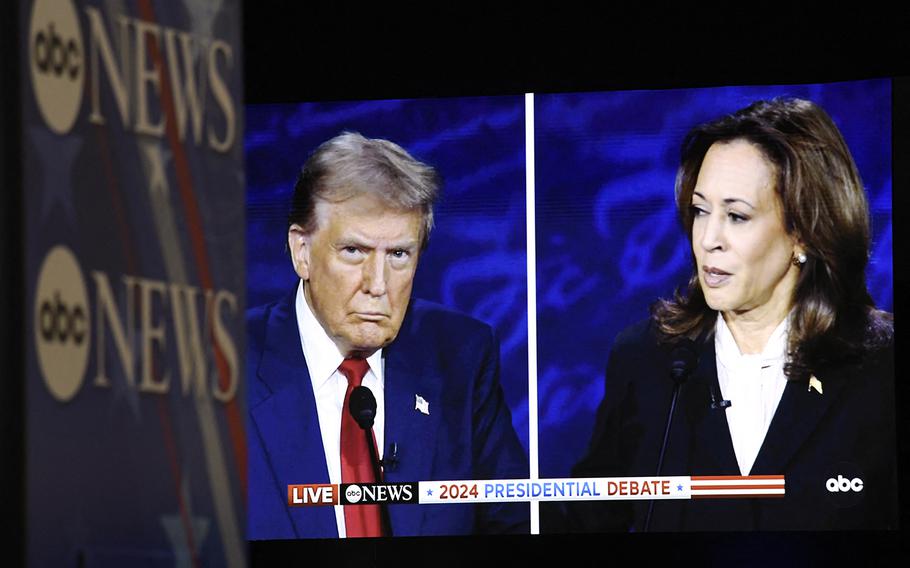
Vice President and Democratic presidential candidate Kamala Harris and former President and Republican presidential candidate Donald Trump are seen on a screen in the spin room as they participate in a presidential debate at the National Constitution Center in Philadelphia on Sept. 10, 2024. (Matthew Hatcher/AFP via Getty Images/TNS)
WASHINGTON (Tribune News Service) — Microsoft Corp. President Brad Smith warned the danger of foreign interference in the U.S. election will surge in the final two days of the presidential campaign.
“The most perilous moment will come, I think, 48 hours before the election,” Smith told the Senate Intelligence Committee on Wednesday.
Smith said that was the “lesson to be learned” from the Slovakian election last fall, in which fake audio of one of the top candidates circulated online days before the election.
Foreign actors already have been spreading manipulated videos and false posts to sow discord around the U.S. presidential election, Smith and other executives with the country’s largest tech companies testified.
Smith said Microsoft earlier Wednesday had identified an “AI-enhanced” video from a Russian group showing Vice President Kamala Harris saying words she didn’t say at a recent rally.
Groups from adversarial nations including Russia, China and Iran have spread false information and news reports about both Harris’ and Donald Trump’s campaigns, the executives said.
The hearing featured testimony from Smith, Google parent Alphabet Inc.’s president and chief legal officer Kent Walker, and Nick Clegg, Meta Platforms Inc.’s president of global affairs.
Those attacks are being shaped in part by new developments in artificial intelligence, Walker said.
“We are seeing some foreign state actors experimenting with generative AI to improve existing cyberattacks, like probing for vulnerabilities or creating spearphishing emails,” Walker said. “We see generative AI being used to more efficiently create fake websites, misleading news articles and robot social media posts.”
The Senate Intelligence Committee hearing, focused on foreign interference in U.S. elections, comes on the heels of a Microsoft report that found Russian efforts to influence the U.S. election have shifted to smearing Harris with doctored and misleading videos. Meta on Tuesday also announced it was banning Russian state media outlet Russia Today due to “foreign interference.”
The Biden administration and the top tech companies stopped communicating about online threats to U.S. elections over the past year as they waited for a ruling in Murthy v. Missouri, a case centered on whether it is constitutional for government officials to ask social media companies to take down certain posts.
The U.S. Supreme Court in June cleared the Biden administration to communicate freely with social media companies, an election-year ruling that bolstered the government’s ability to seek removal of what officials see as misinformation. The justices, voting 6-3, tossed out court-imposed restrictions on contacts by the White House and several federal agencies.
Virginia Democratic Sen. Mark Warner, the chair of the Senate Intelligence Committee, several times expressed frustration that Elon Musk’s X Corp. declined to send a representative to testify at the hearing.
©2024 Bloomberg L.P.
Visit bloomberg.com.
Distributed by Tribune Content Agency, LLC.